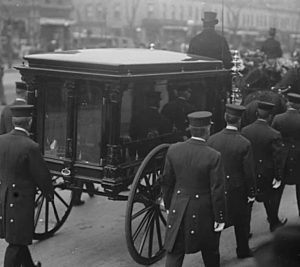Hugh Bonner’s funeral, St. Patrick’s Day, 1908, NYC
October 26, 2020
By Arthur H. Gunther III
I am partly of Bonner heritage, Irish through my grandmother Mary and also Scot as the family was Bonnar there before some went to Donegal. This matters to me mostly, in 2020 especially, because I am distantly related to Mary’s Great-Uncle Hugh Bonner, the first chief of department of the newly formed Fire Department of New York and later the sixth fire commissioner. It matters because this is a dramatic, pivotal election year, and this is the United States, the nation that has the “welcoming” Statue of Liberty in New York’s harbor. It matters because I want to see more Hugh Bonners — white, black, brown, red, yellow, female, transgender, gay, straight in humble service.
And it matters because Bonner, who passed of pneumonia in March 1908, after working a job — yet another Gotham blaze — was a man of humble service who rose from immigrant roots in the Irish Great Hunger and the poverty of crime-ridden Five Points in Manhattan to help direct the heroism of the fire department and to offer lifesaving tools without claiming patent. He also authored a treatise on fighting fires in tenements with central light shafts that acted as chimneys when there was a blaze. Those shafts were banned in future construction, saving many lives.
The New York Times’ report of Bonner’s passing noted that he “owed his position in the department to his high sense of duty.” A Times editorial read: “In Hugh Bonner this community has lost a man who placed its Fire Department at the head of similar organizations in the service of the world’s great cities. He ran New York’s first self-propelling fire engine and its first chemical engine; he operated the first water tower ever used; he invented the life net and various devices for reaching the heart of a fire more quickly … New York proudly mourns his death.”
It is the accident of birth that brings this humble man of service to my lineage, but knowing his history makes me more deeply bow to the great possibilities of people rising from hunger and want who grow to serve through stacked odds. That’s my kind of nation, and I tremble that it will disappear in the current indecency of false prophets.
Today, so many potential Hugh Bonners do not survive to achieve; so many are pushed aside, wounded and killed by racism, prejudice, by the greedy who send their jobs away, by the elected who don’t walk the talk of equal opportunity, by the fakers who proclaim rescue while picking the pockets of the gullible.
Hugh Bonner is why I voted so proudly in this presidential election.
The writer is a retired newspaperman. ahgunther@yahoo.com
–30–

